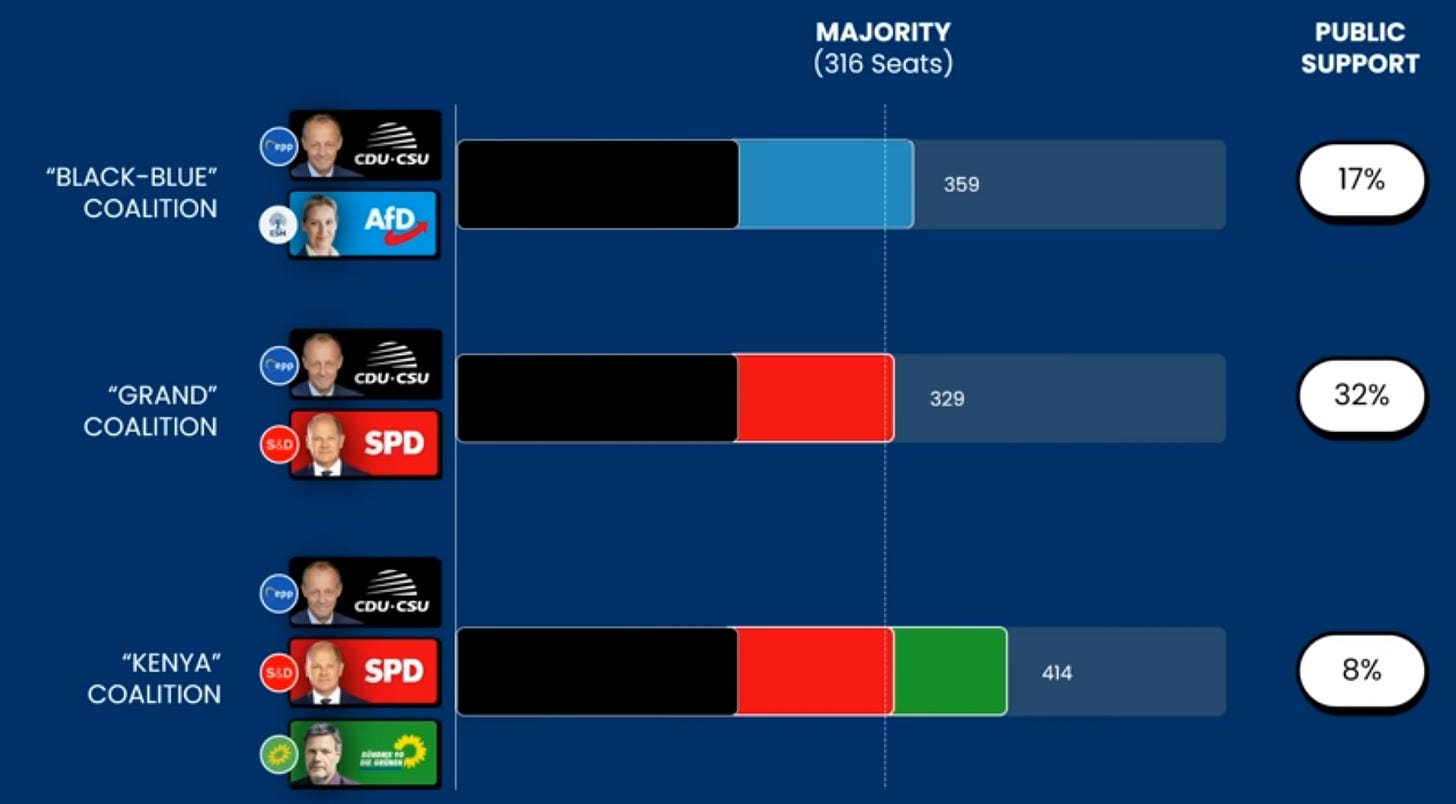Germany just held their general elections yesterday and a record 83% of voters cast their ballots. As expected, the three parties making up the German government's "traffic light" coalition (SPD, Free Democrats and the Greens) got absolutely trounced by the voters. Olaf Scholz's SPD, which suffered the worst result in the party's history. The election's clear winner is Friedrich Merz's conservative CDU-CSU coalition with 28.6% of the vote (a 4.4% improvement over their 2021 result), giving them 208 seats in the Bundestag (parliament). That, however, was a dubious success: it was the second worst showing for CDU-CSU in German electoral history.
The real upset was Alice Weidel's "far right" AfD party, which came in second with 20.8% of the vote (a 10.4% improvement over 2021) and 151 parliament seats. Scholz's SPD only won 16.4% of the vote (9.3% less than in 2021) and 121 seats in parliament. The already unpopular Greens led by Robert Habeck won 11.6% of the vote and 85 seats. Die Linke (the Left) won 8.8% of the vote (64 seats), which was actually a small improvement over their 2021 result.
The two worst performing parties, and Shara Wagenknecht's BSW and Christian Lindner's "Free Democrats" only won 4.9% and 4.3%, respectively, dropping below the 5% threshold and winning zero seats in the Bundestag.
Forming a new government: it’s complicated…
As a result, it will be CDU-CSU's Merz who'll become Germany's next chancellor and form the new majority German government. Merz is perhaps a more conservative version of Angela Merkel with a strong allegiance to the EU, NATO and Ukraine. He has been one of the most vocal supporters of Ukraine, calling for increased military and financial aid for the Zelensky government, including the delivery of Germany's Taurus missiles and the technical support necessary to strike deep inside Russia. Merz has also called for a distancing from the U.S. and greater independence for Germany. As a corporate lawyer and the former chairman of BlackRock in Germany, Merz seems to have a few qualities in common with the late John Foster Dulles, not a comforting thought.
However, forming the next government could prove complicated for Merz... His easiest option would be to form a coalition with AfD, which would give them the majority with 359 seats in parliament (to form a majority government, a minimum of 316 Bundestag seats are required). However, Merz has categorically rejected the idea of forming a coalition with Weidel's AfD, stating that, "There are no commonalities between AfD and the Union [of CDU and CSU]."
Alternatively, Merz could form a coalition with Olaf Scholz's SPD for a razor-thin majority of 329 seats in parliament. The third possibility would be the "Kenya" coalition of CDU-CSU, SPD and the Greens (named as such because the colors associated with the three parties resemble the flag of Kenya).
The Kenya coalition would have a comfortable majority of 414 seats in parliament and in this sense form the strongest of the three possible coalitions. It is however unlikely: the CSU part of CDU-CSU is strongly against including the Greens in the new coalition and especially its leader, Economy Minister Robert Habeck. The most likely future government could be formed between CDU-CSU and SPD, another round of same-old, same-old for Germany in spite of Friedrich Merz's rhetoric about changes, stronger leadership, more assertive Germany, etc.
The reality is that Germany is still an occupied nation with 16 American, 4 NATO and 2 British military bases on its territory so it remains to be seen how much of his tough talk Merz can actually deliver. Perhaps the only area where Germany's policies might change will be in a more aggressive stance toward Russia. But we'll see.
To learn more about TrendCompass reports please check our main TrendCompass web page. We encourage you to also have a read through our TrendCompass User Manual page.
Trading signals for Key Markets, 24 Feb. 2025
With Friday’s closing prices we have a busier than usual trading day with the following signals:
Keep reading with a 7-day free trial
Subscribe to I-System TrendCompass to keep reading this post and get 7 days of free access to the full post archives.







